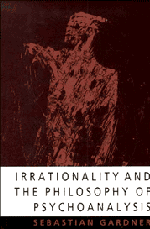Book contents
- Frontmatter
- Contents
- Acknowledgements
- Note on the text
- Introduction
- PART I DIVIDING PERSONS
- PART II PSYCHOANALYTIC CONCEPTS
- PART III PSYCHOANALYTIC CONCEPTION OF MIND
- Appendices
- I A taxonomy of metapsychologies
- II Kleinian metapsychology and its critics
- III Lacan on Klein
- Notes
- Works of Freud cited
- Bibliography
- Index
II - Kleinian metapsychology and its critics
Published online by Cambridge University Press: 21 October 2009
- Frontmatter
- Contents
- Acknowledgements
- Note on the text
- Introduction
- PART I DIVIDING PERSONS
- PART II PSYCHOANALYTIC CONCEPTS
- PART III PSYCHOANALYTIC CONCEPTION OF MIND
- Appendices
- I A taxonomy of metapsychologies
- II Kleinian metapsychology and its critics
- III Lacan on Klein
- Notes
- Works of Freud cited
- Bibliography
- Index
Summary
Edward Glover's ‘An examination of the Klein system of child psychology’ is a lengthy, detailed and highly polemical attack on Klein and the Klein Group. It was written in response to the Controversial Series of Discussions – concerned with the differences between Klein and Anna Freud – held at the British Psycho-Analytical Society in 1943–4. Glover's case is hard to summarise (see pp. 15–16 of the ‘Examination’), but some central points can none the less be identified, and I will try to indicate how a Kleinian might respond to them. The interest of Glover's piece is that it focuses on the main alleged weakness of Kleinian theory.
Glover concedes that Kleinian theory legitimately identifies a gap in classical Freudian theory at the level of pre-Oedipal life. He furthermore admits the cogency of the basic concept of phantasy, and the existence of some ‘true generalisations’ in Kleinian theory. Glover's chief complaints are that Kleinian theory is either (i) theoretically confused and/or non-Freudian, or (ii) dependent on clinical suppositions which are either unproven, or presuppose some contentious bit of theory.
With regard to (i): Glover alleges in very general terms that the concept of phantasy is over-employed (pp. 19–25). His arguments largely re-analyse into distinct elements concepts that Klein explicitly intends as synthetic in relation to their Freudian precursors; or, he points out that Kleinian theory presupposes forms of psychological organisation that would not be available to it on other theories (such as Glover's own).
- Type
- Chapter
- Information
- Irrationality and the Philosophy of Psychoanalysis , pp. 246 - 247Publisher: Cambridge University PressPrint publication year: 1993



